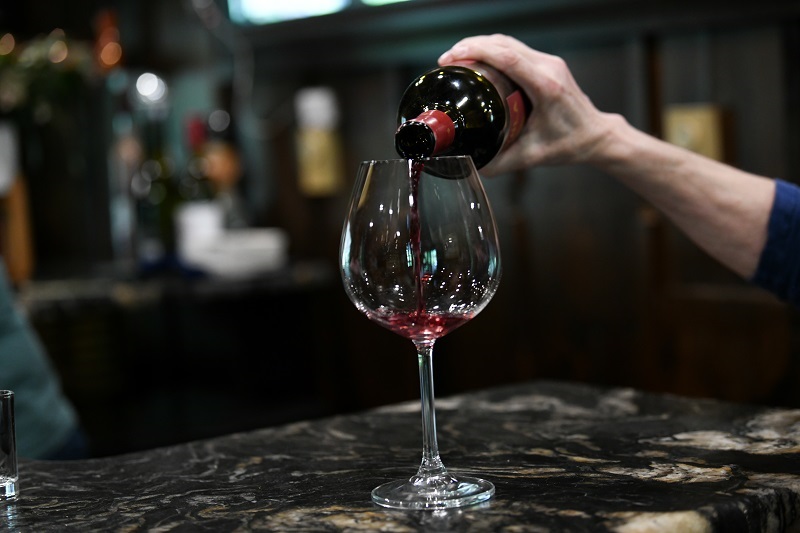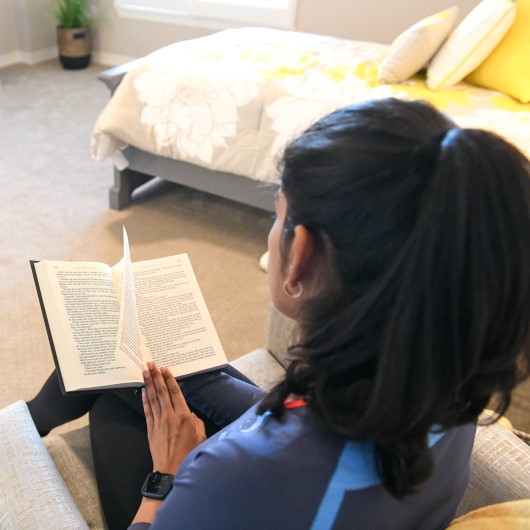Here’s How Alcohol Affects Your Sleep

June 14, 2023
When you drink alcohol, it acts as a depressant for your central nervous system, meaning that it can cause brain activity to slow down.
Alcohol can behave like a sedative, increasing relaxed and tired feelings.This is why alcohol helps you fall asleep. However, during the night, as the amount of alcohol in your blood drops, you are likely to wake up. As a result, when consumed in excess, alcohol can lead to shorter sleep duration and a poorer quality of sleep. Those with alcohol use disorders can experience insomnia due to this. Alcohol can also worsen your symptoms if you have sleep apnea.
How does alcohol affect my sleep?
“Every person reacts differently to alcohol. Your sleep can largely be affected by the amount of alcohol you drink, how frequently you are drinking, your age and the composition of your body,” says neurologist and sleep medicine expert, Georges Ghacibeh, M.D. “When you drink alcohol, it is absorbed into your bloodstream and then metabolized by the enzymes in your liver. This process can be slow, leaving alcohol circulating in your body.”
There are multiple aspects of sleep that alcohol can have an impact on:
- Quality: quality of sleep can differ due to how much you are drinking, as well as other factors such as your age, gender, body, etc. Drinking alcohol reduces the amount of time in the restorative rapid eye movement (REM) sleep, which is crucial for healing, retaining memory and feeling rested
- Small serving of alcohol: under two drinks for men and under one for women can decrease sleep quality by 9.3%
- Moderate serving of alcohol: about two drinks for men and one for women can decrease sleep quality by 24%
- Large serving of alcohol: more than two drinks for men and more than one for women can decrease sleep quality by 39.2%
- Dreams: since alcohol can suppress REM, when alcohol levels drop later in the night, you are likely to experience more active REM sleep. As a result:
- You are more likely to have very vivid or stressful dreams
- Uncomfortable dreams cause you to wake up more frequently throughout the night
- You are more likely to remember your dreams
- Duration: your sleep will be more fragmented
- The pattern of sleep that the body goes through to get from cycle to cycle will be interrupted
- You are likely to wake up at each interval or several times throughout the night as your body tries to follow this pattern
- You will fall asleep quicker, but have trouble staying comfortably asleep
- As the night continues, you will experience more slow-wave sleep than REM sleep
- Slow-wave sleep: the deepest phase of non rapid eye movement (NREM) sleep which is essential for feeling “refreshed” after waking up
- Alcohol increases urine output
- You will have to wake up more often throughout the night to use the bathroom
How can alcohol worsen symptoms of other sleep disorders?
Alcohol & Insomnia
Alcohol can disrupt your sleep and reduce your ability to have consistent REM sleep. When consumed before bedtime, alcohol can increase your risk of experiencing insomnia and its related symptoms.
Insomnia is a common sleep disorder that causes difficulty falling or staying asleep. Due to the lack of uninterrupted sleep you can experience overnight, you are more prone to feeling excessively tired throughout the next day.
When drinking before bed, be mindful of the potential to develop symptoms of insomnia. Excessive sleepiness during the day caused by insomnia can lead you into a routine that uses alcohol to induce sleepiness at night and overuses stimulants such as coffee and caffeinated soda throughout the day to stay awake. This can become a habit that can create an unhealthy reliance on alcohol.
Alcohol & Sleep Apnea
Alcohol can cause the muscles in your throat to relax, which creates more resistance when breathing. This can worsen sleep apnea symptoms by causing your airway to be more likely to collapse while sleeping.
Drinking alcohol before bed can cause heavier snoring and increase the risk of sleep apnea by 25%. Sleep apnea can overall lower your quality of sleep and cause disruptions throughout the night.
Alcohol & Sleep-inducing Medicines
If you’ve had alcohol, you should refrain from using medications that can induce sleepiness or aid with sleep, such as Ambien, Benadryl, Tylenol PM and even melatonin. Taking these with alcohol can be dangerous as alcohol depresses the central nervous system on its own.
If you have concerns about your sleep or alcohol use, talk to your health care provider – they can help evaluate your routines and sleep to note if adjustments should be made.
Next Steps & Resources:
- Our source: Georges Ghacibeh, M.D.
- To make an appointment with a physician near you, call 800-822-8905 or visit our website.
The material provided through HealthU is intended to be used as general information only and should not replace the advice of your physician. Always consult your physician for individual care.






